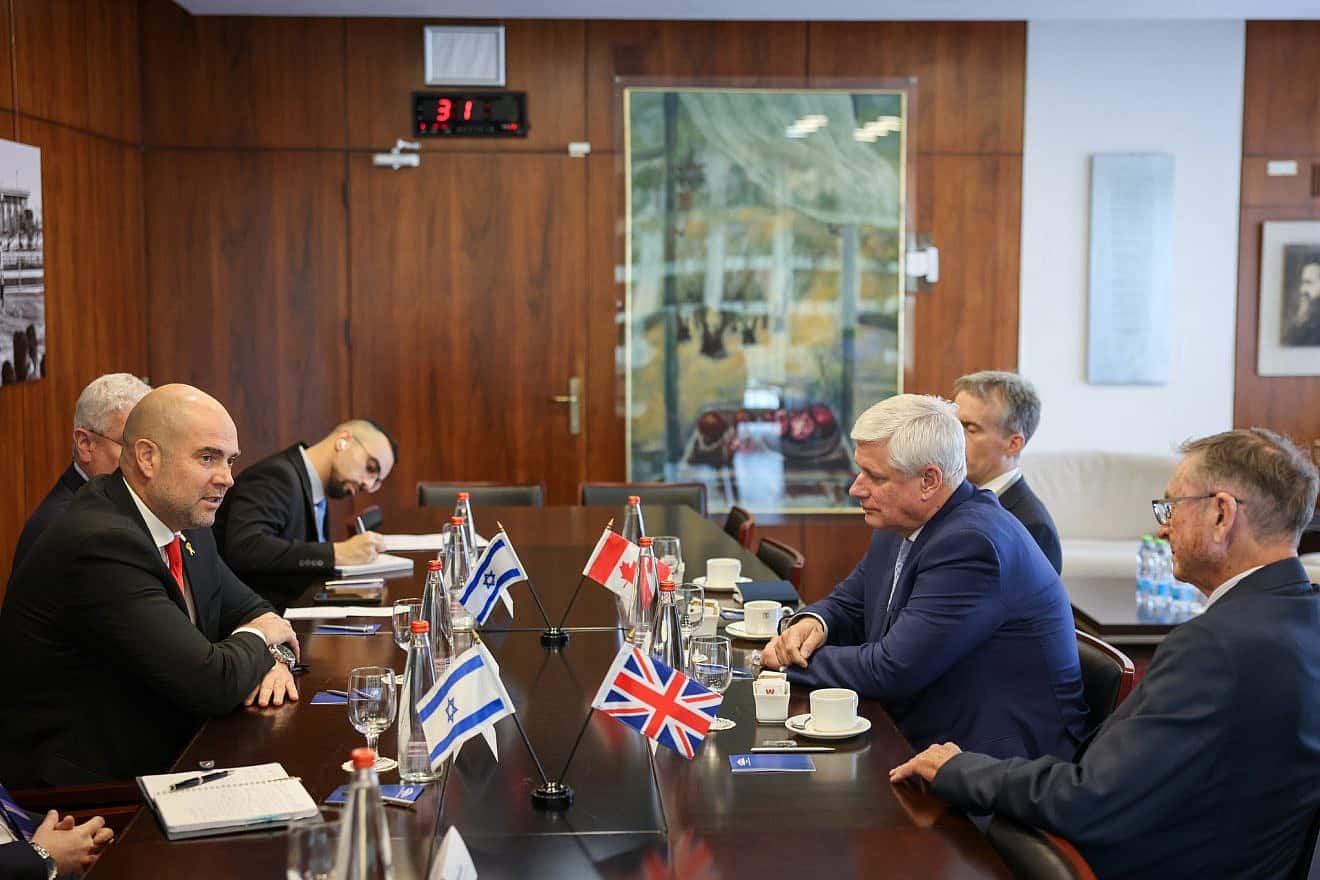by Joshua Marks
In Israel for a surprise solidarity visit, Stephen Harper in an op-ed also called the U.S.-led push for Palestinian statehood "insincere, hypocritical and beyond foolish."
 |
| Former Canadian prime minister Stephen Harper (right), sits across the table from Knesset Speaker Amir Ohana in Jerusalem on Feb. 18, 2024. Source: X. |
Former Canadian prime minister Stephen Harper on Sunday called on Israel’s allies to stop asking it to abandon its war aim of eliminating Hamas, and instead to pressure Hamas to surrender.
In an op-ed published in The National Post, Harper said that Israel’s position regarding Hamas was the same as the Allies’ regarding Nazi Germany, and that its war against the terror group should end in the same manner as did the war against the Nazis.
The long-time vocal supporter of the Jewish state arrived there on Sunday for a surprise solidarity visit in the wake of the Oct. 7 massacre and to celebrate the tenth anniversary of his address to the Knesset on Jan. 20, 2014.

Describing the Hamas-led attack on the northwestern Negev that killed 1,200 people as genocidal “acts of extermination,” the 64-year-old Conservative Party member and devout Christian wrote that it was imperative that Israel force the Gaza-based terrorist group to capitulate.
“Israel’s war objective—the elimination of Gaza’s Hamas regime—is essential. Leaving the job unfinished, with Hamas’s existence tolerated and its actions contained, has been tried, and it has failed. The Israeli people cannot be reasonably asked to return to the pre-war status quo,” he wrote.
“That is the position our own nations took toward the attacks launched by Nazi Germany against us. Israel has as absolute a right to absolute security now as we did then,” he continued.
“And it should end the same way our war with the Nazis did—by the unconditional surrender of its perpetrators. I say to Israel’s friends, stop asking it to stop short of victory. Instead, bring pressure to bear on Hamas, directly and through its allies and partners, to force its capitulation.”
Upon his arrival in Jerusalem on Sunday, Harper was greeted by Knesset Speaker Amir Ohana. The former Canadian premier tweeted that he was visiting Israel again “to renew friendships and stand in solidarity at this time of great challenge and adversity.”
For his part, Ohana tweeted that the two discussed “the security challenges facing the State of Israel, including the war in Gaza, the developments on the northern front and of course the head of the snake—Iran.” The Likud Party member also emphasized that Israel will not stop until the hostages are returned and Hamas is defeated.
ארחתי היום בכנסת את אחד מידידי ישראל הטובים בכל הזמנים, ראש ממשלת קנדה לשעבר, סטיבן הרפר, העומד כיום בראש ארגון המפלגות השמרניות בעולם.
— Amir Ohana - אמיר אוחנה (@AmirOhana) February 18, 2024
הרפר בחר בכנסת כיעד הראשון, והגיע כשהוא מלווה בלורד אשקרופט, אחד מידידי ישראל הטובים בבריטניה.
שוחחנו על האתגרים הביטחוניים עימם מתמודדת מדינת… pic.twitter.com/DnPhfZtMRp
Harper also met in Jerusalem with Foreign Minister Israel Katz and the
families of Hamas’s victims and hostages, describing the encounter as
“emotional” in an X post.
Thank you Foreign Minister @Israel_Katz for hosting an emotional meeting in Jerusalem with families of those missing and murdered in the Oct. 7 Hamas attack. I am moved by their strength and determination in the face of unimaginable pain. Those responsible for these barbaric… pic.twitter.com/1Qi9zCAfCO
— Stephen Harper (@stephenharper) February 18, 2024
In Tel Aviv on Sunday, Harper met with Israeli Intelligence Minister Gila Gamliel, who also serves as vice chair of the International Democracy Union, an international alliance of center-right political parties headed by Harper.
He is accompanied on his visit to Israel by Lord Michael Ashcroft, the former deputy chairman of the Conservative Party in the United Kingdom.
He is also expected to meet with Israeli Prime Minister Benjamin Netanyahu and other senior officials during his brief visit, which ends on Tuesday, as well as tour Kibbutz Nir Oz, one of the southern Israeli communities targeted in the Hamas-led attack of Oct. 7.
In his op-ed, the Canadian politician, who served as prime minister from 2006 until 2015, also called the U.S.-led push for Palestinian statehood “insincere, hypocritical and beyond foolish,” arguing that Palestinian rejectionism of Israel must be rooted out before any talk of a two-state solution.
“A two-state solution will not magically take root now for the same reason it has not happened in every year since 1947—it is rejected by way too many Palestinians. The core problem is not Israel. Yes, there are obstacles in Israel that must someday be overcome. But Israel could have incorporated all Palestinian territory long ago, and it has not done so,” Harper wrote.
“In contrast, generations of Palestinians have been inculcated with one-state mantras—’from the river to the sea,’ ‘the right of return,’ ‘settler occupation,’ and so on. At their heart they categorically reject the right of a Jewish state to exist on any piece of the land of the former Mandate for Palestine.
“We must stop pretending that a two-state solution can be pursued in the face of the continued propagation of such a view. Yes, we must develop a roadmap that will lead to a Palestinian state, and Israel needs to contribute to that. But Israel should not be asked to go down that path as long as such ideologies are allowed to flourish on the Palestinian side,” he continued.
Harper also scolded Western leaders for continuing to appease the radical Islamist regime in Tehran, putting the entire world in peril.
“Some in western capitals chose to continue seeking reconciliation with an Iranian regime whose vision could not be more different. And so, we turned a blind eye to Tehran’s continued preaching of medieval jihad and its ongoing construction of a theocratic empire. We watched as it slowly took over Iraq, Lebanon, Syria, Yemen, and, of course, Gaza. We ignored advice from both Arab and Israeli allies to counter these threats, and even criticized actions designed to do so,” Harper concluded.
“I mean the real, potentially global, threat of a powerful regional state that mixes an aggressive and malevolent ideology with the pursuit of nuclear weapons capability. I am hoping that we understand this bigger picture before it is too late.”
Joshua Marks
Source: https://www.jns.org/former-canadian-pm-calls-hamas-defeat-essential/
No comments:
Post a Comment